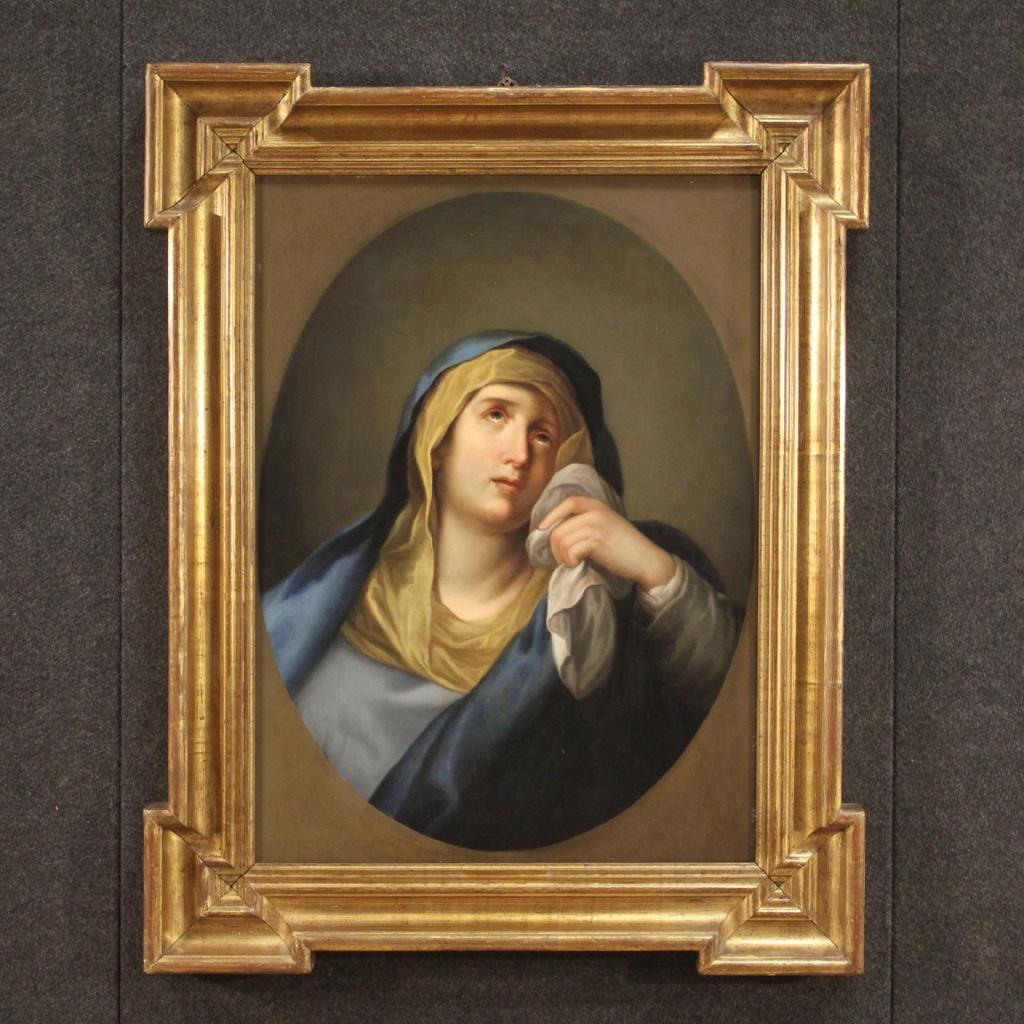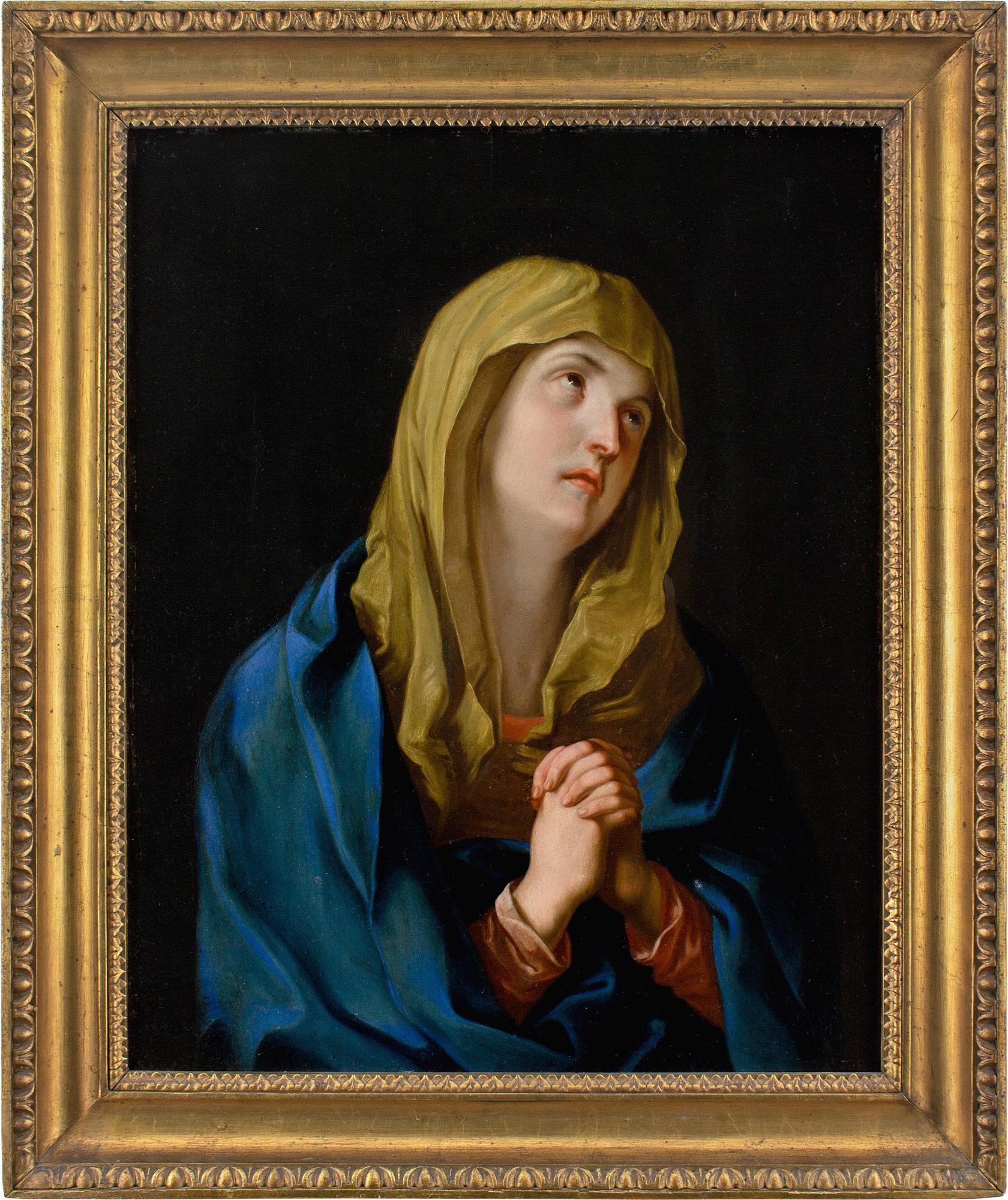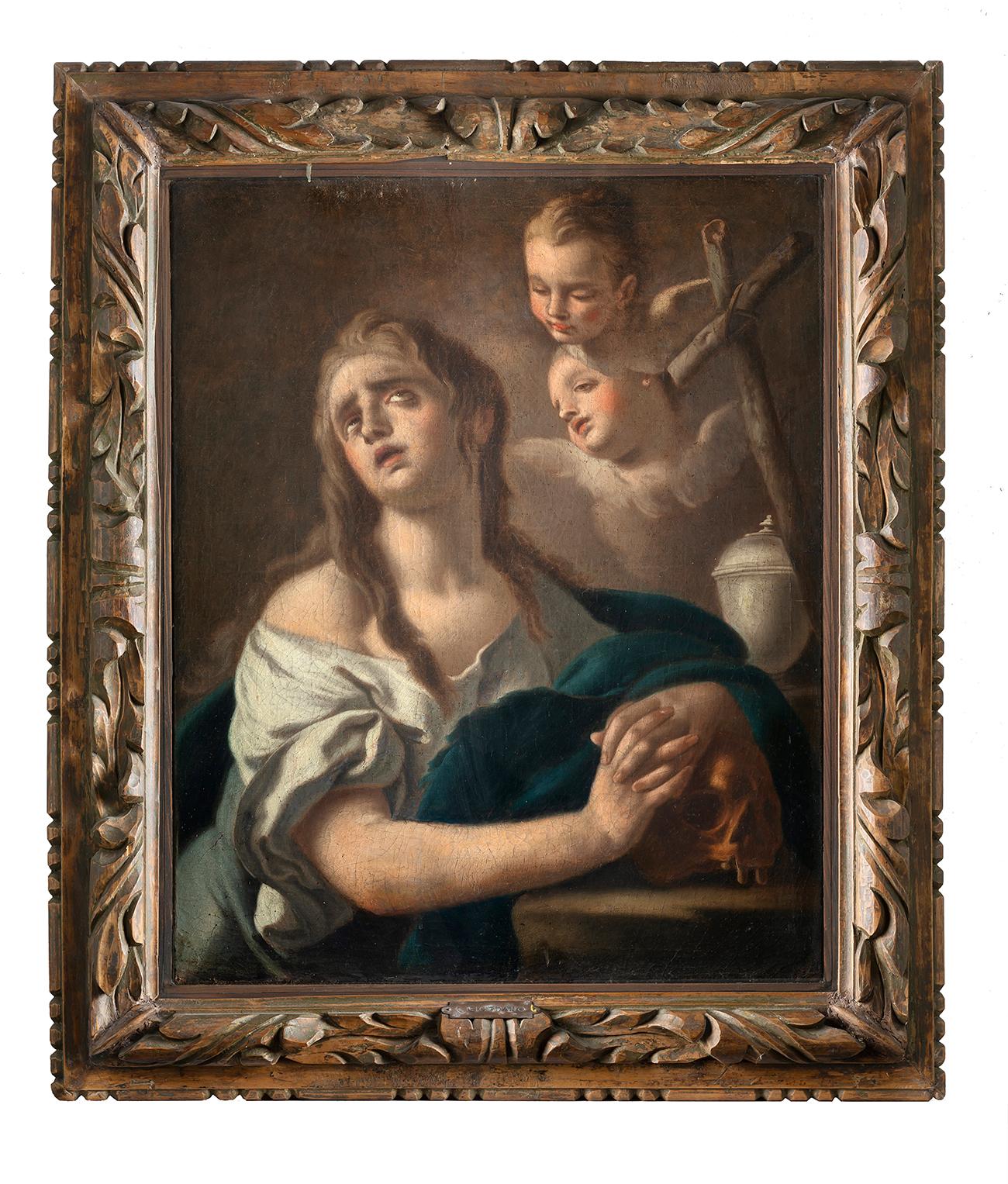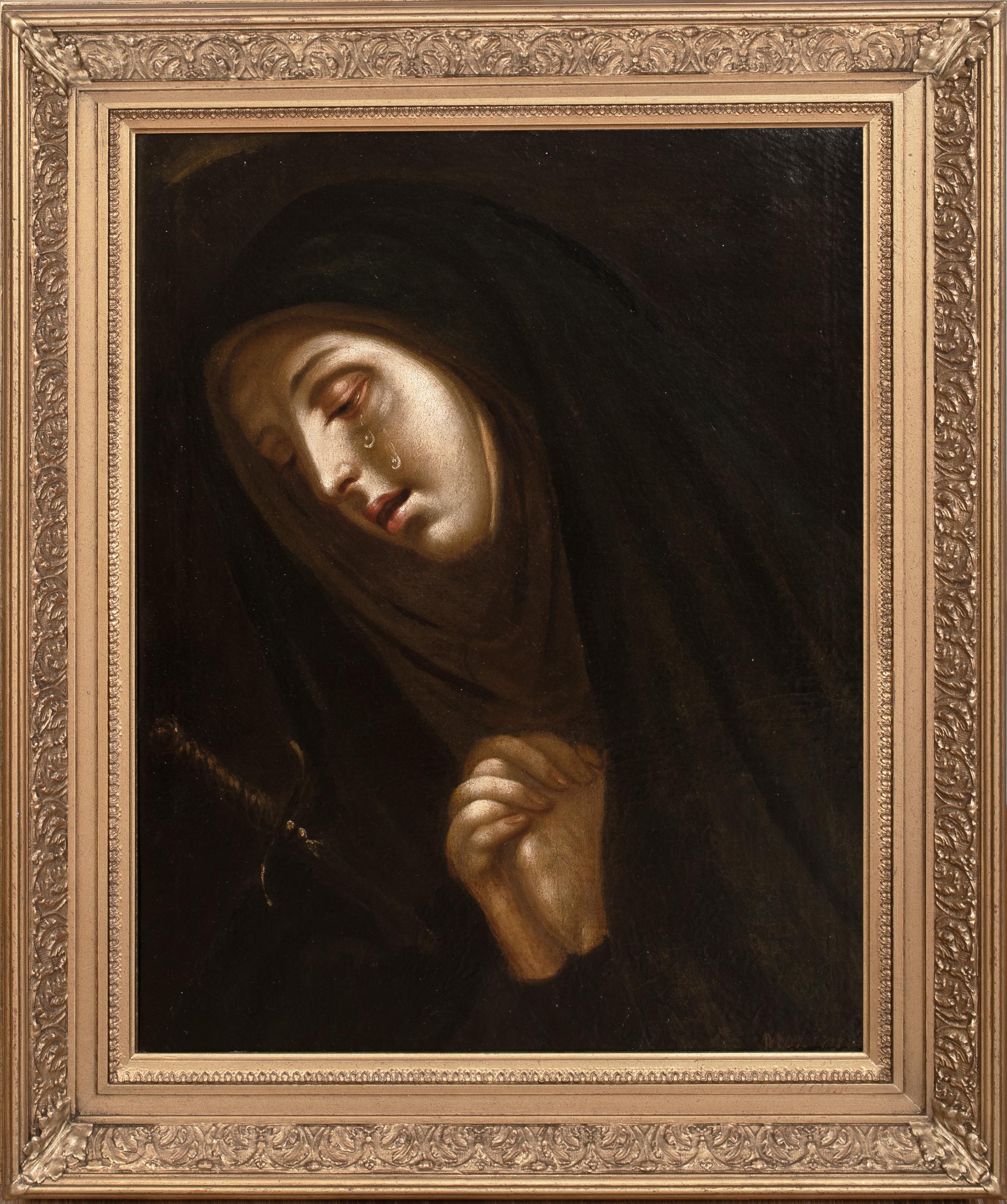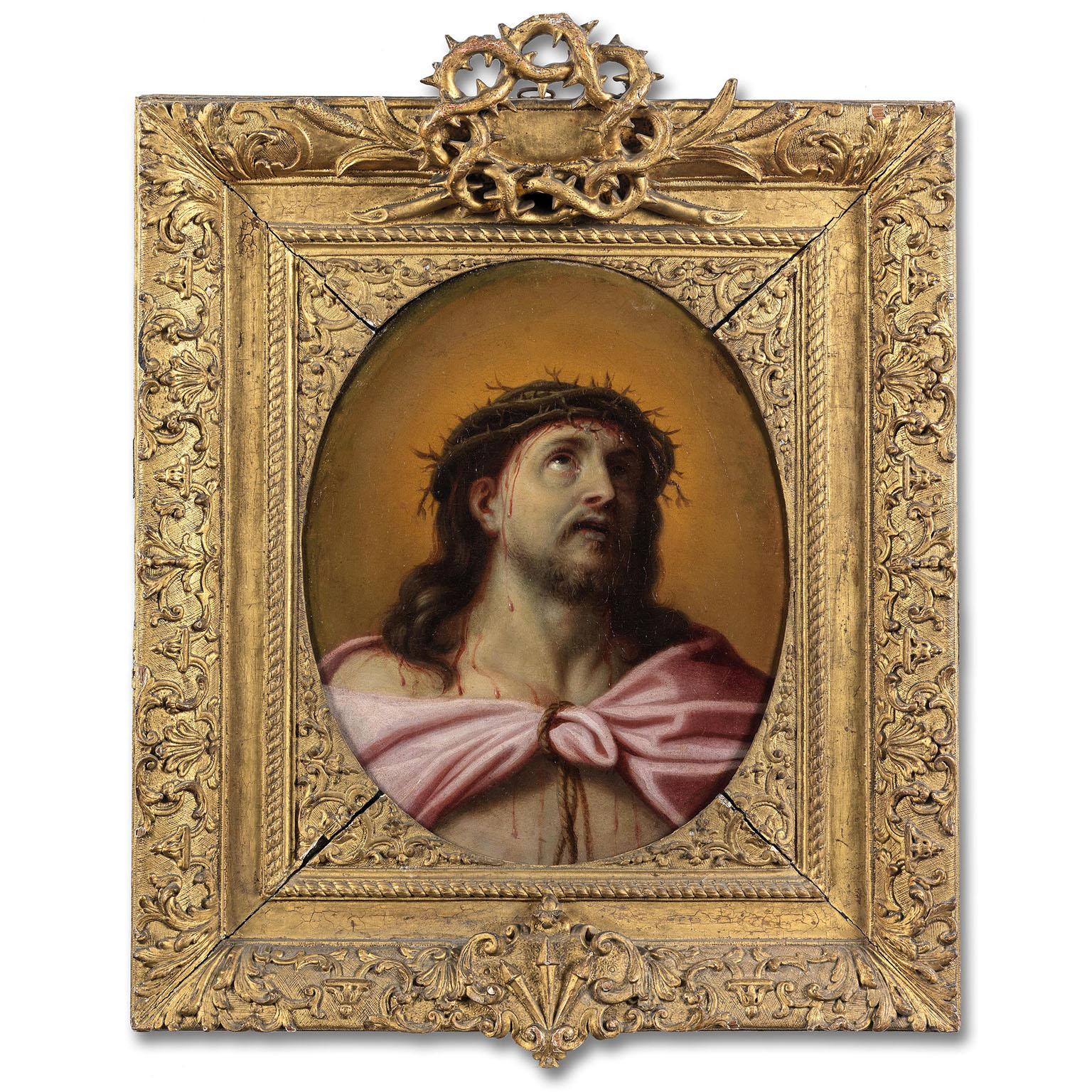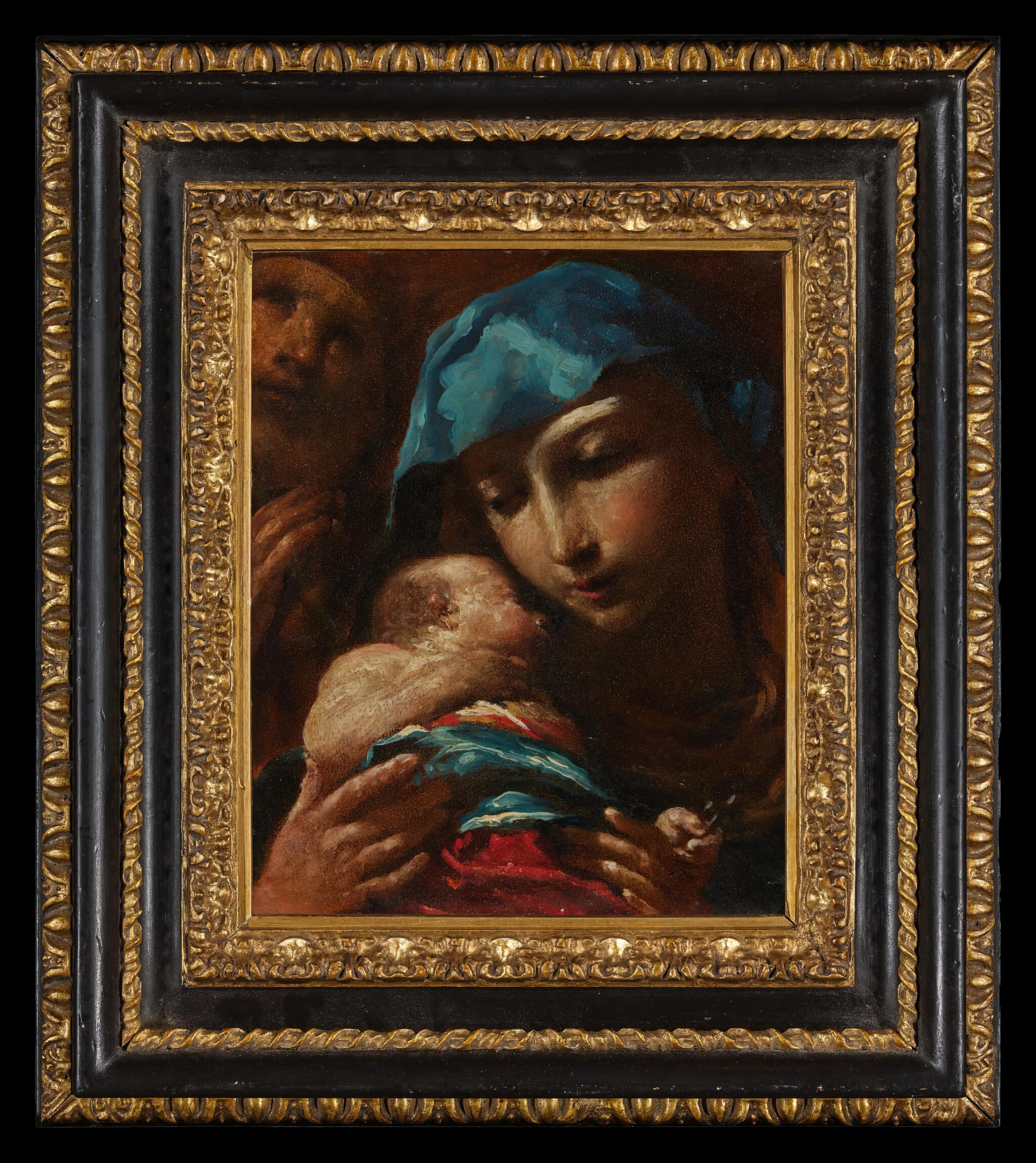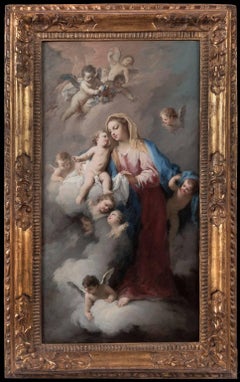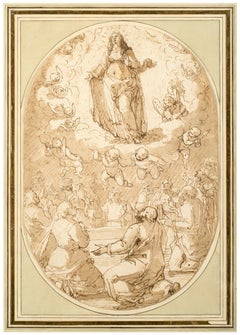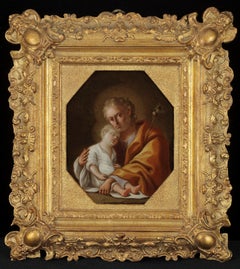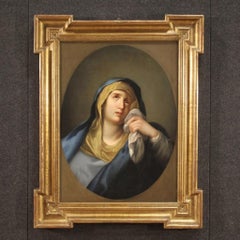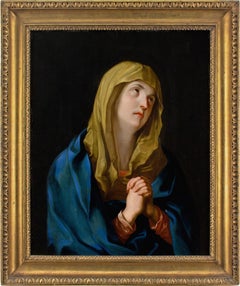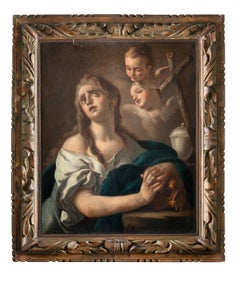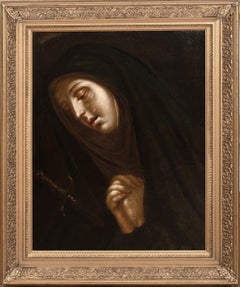Items Similar to Head of the Virgin
Want more images or videos?
Request additional images or videos from the seller
1 of 5
Giovanni Battista Tiepolo Head of the Virginca. 1740
ca. 1740
$185,000
£139,837.08
€160,697.67
CA$257,611.35
A$286,582.09
CHF 150,229.92
MX$3,501,963.10
NOK 1,912,990.59
SEK 1,800,815.99
DKK 1,199,547.03
Shipping
Retrieving quote...The 1stDibs Promise:
Authenticity Guarantee,
Money-Back Guarantee,
24-Hour Cancellation
About the Item
Provenance: Private Collection, Paraguay.
This unpublished Head of the Virgin is a new addition to the rich corpus of paintings by Giovanni Battista Tiepolo. While the artist frequently depicted Mary—in Madonna and Child compositions, altarpieces with numerous saints, or in related thematic subjects, such as the Immaculate Conception—single figure depictions of her are extremely rare. The closest comparable work in format and subject is an evocative Madonna recently on the New York art market (Fig. 1). Although of clear devotional intent, the present painting seems as much a portrait of a woman, one lost in her own thoughts, as an evocation of the Virgin Mary. Enveloped in drapery and with her downcast hooded eyes, our Virgin takes her place among the artist’s suggestive female subjects, both secular and sacred, who seem to dwell in a space of personal remove and spiritual fulfilment.
Dr. William Barcham has confirmed Tiepolo’s authorship of the present painting on the basis of firsthand inspection (February 2024), while allowing the possibility that the drapery might have been completed by a member of the artist’s workshop. He dates the painting to the 1740s, the years of his productive activity in Venice prior to his departure to Würzburg in 1750.
- Creator:Giovanni Battista Tiepolo (1696 - 1770, Italian)
- Creation Year:ca. 1740
- Dimensions:Height: 26.5 in (67.31 cm)Width: 20.88 in (53.04 cm)
- Medium:
- Movement & Style:
- Period:
- Condition:
- Gallery Location:New York, NY
- Reference Number:1stDibs: LU10215916502
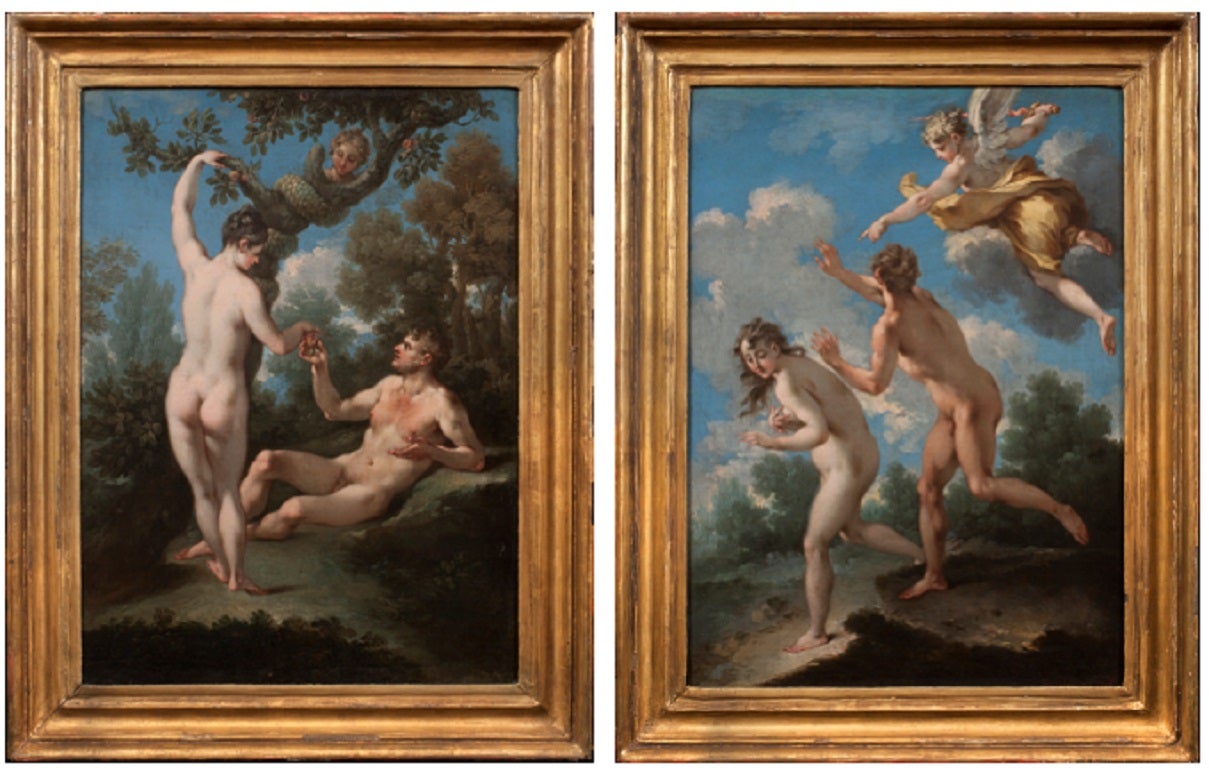
About the Seller
5.0
Recognized Seller
These prestigious sellers are industry leaders and represent the highest echelon for item quality and design.
Established in 1997
1stDibs seller since 2012
22 sales on 1stDibs
Typical response time: 5 hours
- ShippingRetrieving quote...Shipping from: New York, NY
- Return Policy
Authenticity Guarantee
In the unlikely event there’s an issue with an item’s authenticity, contact us within 1 year for a full refund. DetailsMoney-Back Guarantee
If your item is not as described, is damaged in transit, or does not arrive, contact us within 7 days for a full refund. Details24-Hour Cancellation
You have a 24-hour grace period in which to reconsider your purchase, with no questions asked.Vetted Professional Sellers
Our world-class sellers must adhere to strict standards for service and quality, maintaining the integrity of our listings.Price-Match Guarantee
If you find that a seller listed the same item for a lower price elsewhere, we’ll match it.Trusted Global Delivery
Our best-in-class carrier network provides specialized shipping options worldwide, including custom delivery.More From This Seller
View AllHead of a Classical Poet (Socrates?)
By Pier Francesco Mola
Located in New York, NY
Provenance:
Possibly Antonio Amici Moretti, Rome, 1690
Roy Clyde Gardner, Union, Mississippi, 1970s until 2004; by whom given to:
Mississippi Band of Choctaw Indians, 2004-2010
Lit...
Category
17th Century Baroque Paintings
Materials
Canvas, Oil
Madonna and Child with Angels in the Clouds
Located in New York, NY
Provenance: Charles H. and Virginia Baldwin, Claremont, Colorado Springs, Colorado ca. 1907-1934; thence by descent until sold in 1949 to:
Charles Blevins Davis, Claremont (renamed Trianon), Colorado Springs 1949 -until gifted in 1952 to:
The Poor Sisters of Saint Francis, Trianon, Colorado Springs, 1952 until acquired, 1960, by:
John W. Metzger, Trianon, renamed as the Trianon School of Fine Arts, Colorado Springs, 1960-1967; when transferred to:
The Metzger Family Foundation, Trianon Art Museum, Denver, 1967 - 2004; thence by descent in the Metzger Family until 2015
Exhibited: Trianon Art Museum, Denver (until 2004)
The present work is a spectacular jewel-like canvas by Amigoni, rich in delicate pastel colors, most likely a modello for an altarpiece either lost or never painted. In it the Madonna stands firmly upon a cloud in the heavens, her Child resting on a delicate veil further supported by a cloud, as he gently wraps his arm around his mother’s neck. From above angels prepare to lower flowers and a wreath, while other angels and seraphim surrounding the two joyfully cavort.
Dr. Annalisa Scarpa, author of the forthcoming monograph on Jacopo Amigoni...
Category
18th Century and Earlier Figurative Paintings
Materials
Canvas, Oil
The Assumption of the Virgin
Located in New York, NY
Provenance:
Unidentified collector’s mark “D.G.R,” lower right (Lugt 757b)
Wilhelm Suida (1877–1959), New York; by descent to:
Robert L. and Bertina Suida Manning, New York, until 1996
Private Collection, USA
This impressive drawing of the Assumption of the Virgin is the work of the Genoese artist Giovanni Battista Paggi. The son of a nobleman, Paggi received a humanist education and was a self-taught artist. According to Paggi’s first biographer, Raffaele Soprani, it was only after encountering Luca...
Category
16th Century Old Masters Figurative Drawings and Watercolors
Materials
Paper, Ink, Pen
Joseph Holding the Christ Child
By Pietro Bardellino
Located in New York, NY
Provenance: Private Collection, Argentina.
A work of great delicacy and intimacy, this small painting on copper by Pietro Bardellino treats a subject which grew in popularity during the Baroque period: Saint Joseph and the Christ child...
Category
18th Century Baroque Paintings
Materials
Copper
A Guardian Angel and a Child
Located in New York, NY
Provenance:
Cornelius Vanderbilt, New York; by whom gifted in 1880 to:
The Metropolitan Museum of Art, New York (80.3.673); deaccessioned and sold:
Christie’s, New York, 12 June 19...
Category
17th Century Old Masters Portrait Paintings
Materials
Terracotta, Gesso
Three Angels
By Domenico Piola the Elder
Located in New York, NY
Provenance:
Robert L. and Bertina Suida Manning, New York, until 1996
Private Collection, USA
One of the leading artists in Genoa during the second half of the seventeenth century, Domenico Piola came from a successful family of artists, renowned for their many illusionistic ceiling programs throughout Genoese churches and palaces. A prolific draughtsman and painter, Domenico oversaw an extremely productive studio. In addition to his collaborations with numerous other artists, Domenico also provided many designs for book illustrations and prints that circulated throughout Europe, earning him international exposure and high acclaim in his own day.
As Dr. Anna Orlando has indicated (written communication), the present work is an early work by Piola, datable from the late 1640s. At this time the young artist came strongly under the influence of Castiglione and Valerio Castello, while admiring the works of Giulio Cesare Procaccini. Piola’s works from this period are exuberant and fluid, and the artist’s love of portraying children is evident from the angels and putti that populate both his altarpieces and more intimate paintings.
The present work depicts three angels...
Category
17th Century Baroque Figurative Paintings
Materials
Canvas, Oil
You May Also Like
18th Century Oil on Canvas Italian Religious Painting Virgin of Sorrows, 1770
Located in Vicoforte, IT
Antique Italian painting from the second half of the 18th century. Religious painting depicting the Virgin of Sorrows, of excellent pictorial quality. Oil on canvas framework recentl...
Category
1770s Figurative Paintings
Materials
Canvas, Oil
Joszef Schmidt, After Guido Reni Mater Dolorosa, Antique Oil Painting
Located in Cheltenham, GB
This early 19th-century oil painting by Hungarian artist Joszef Schmidt (1810-1875) depicts the Mater Dolorosa. It’s after a work by Italian artist, Guido Reni (1575-1642). Schmidt w...
Category
Early 19th Century Italian School Figurative Paintings
Materials
Oil, Panel
18th Century by Pietro Bardellino Mary Magdalene Painting Oil on Canvas
By Pietro Bardellino
Located in Milano, Lombardia
Pietro Bardellino (Naples, Italy, 1731 – 1806)
Title: Mary Magdalene
Medium: Oil on canvas
Dimensions: without frame 75 x 60 cm – with frame 97 x 82 cm
Antique shaped and carved wood...
Category
Mid-18th Century Old Masters Portrait Paintings
Materials
Canvas, Oil
Our Lady Of Sorrows, 17th Century circle of Carlo Dolci (1616-1686)
Located in Blackwater, GB
Our Lady Of Sorrows, 17th Century
circle of Carlo Dolci (1616-1686)
Large 17th Century Italian Old Master of The Virgin Mary as depicted as Our Lady ...
Category
17th Century Portrait Paintings
Materials
Canvas, Oil
Fine Italian 17th Century Oil on Canvas Head of Jesus Christ Crowned with Thorns
By (circle of) Pierre Mignard
Located in LA, CA
A very fine Italian 17th century oval oil on canvas "Head of Christ Crowned with Thorns" Circle of Pierre Mignard (French, 1612-1695) within...
Category
17th Century Old Masters Figurative Paintings
Materials
Oil, Canvas, Wood
Holy Family, by the bolgonese master.
By Giuseppe Maria Crespi, Lo Spagnuolo
Located in New York, NY
This exquisite painting, resembling a precious jewel, serves as an exceptional illustration of the devotional cabinet paintings created by Giuseppe Maria Crespi, a highly original Bolognese artist during the late 17th and early 18th centuries. Crespi's distinctiveness extended beyond his unique style and technique to the subjects he chose to portray. While his portraits and genre paintings often displayed a light-hearted and even irreverent tone, his treatment of religious themes resonated with deep emotion, even in its most inventive forms.
This recently uncovered work by Crespi is a typical representation, invoking the tender
connection between mother and child, and the Child's destiny, all within a compact and intimate format. Executed on a small scale, the painting showcases Crespi's remarkable sensitivity and mastery of paint, especially evident in the expressive brushwork of the drapery.
The restrained and focused composition of the Holy Family allows for contemplation of the figures. Mary cradles the Christ child gently, seemingly presenting him to the viewer, her gaze
knowing as the infant holds a diminutive cross, symbolizing his future crucifixion. Joseph appears in the background, emerging from the left side of the frame, gazing upward with folded hands in prayer.
Individual motifs from this painting reappear in other works by Crespi, suggesting a synthesis of familiar elements into a vibrant composition. The artist's revisitation of designs throughout his career is evident, and this painting on copper likely belongs to a later period, reflecting stylistic ties to other works and Crespi's increased production of smaller devotional pieces.
Distinguished by its cool palette, bold coloration, and the expressive force of the artist's hand, this Holy Family painting...
Category
Early 1700s Baroque Figurative Paintings
Materials
Copper
More Ways To Browse
Child 18th Century Painting Portrait
Immaculate Conception
Virgin Mary Portrait
18th Century Female Portraits
18th Century Of Female Portraits
Nude Woman On Horse
Shadow Puppets
Signed Peter Max Posters
Acrylic Grapes
Benjamin C Brown
Michael Rios
Roller Skates Used
Roller Skates
Roller Skating
Waltz Painting
William Spencer
17th Century Venetian Paintings
Basketball Painting
